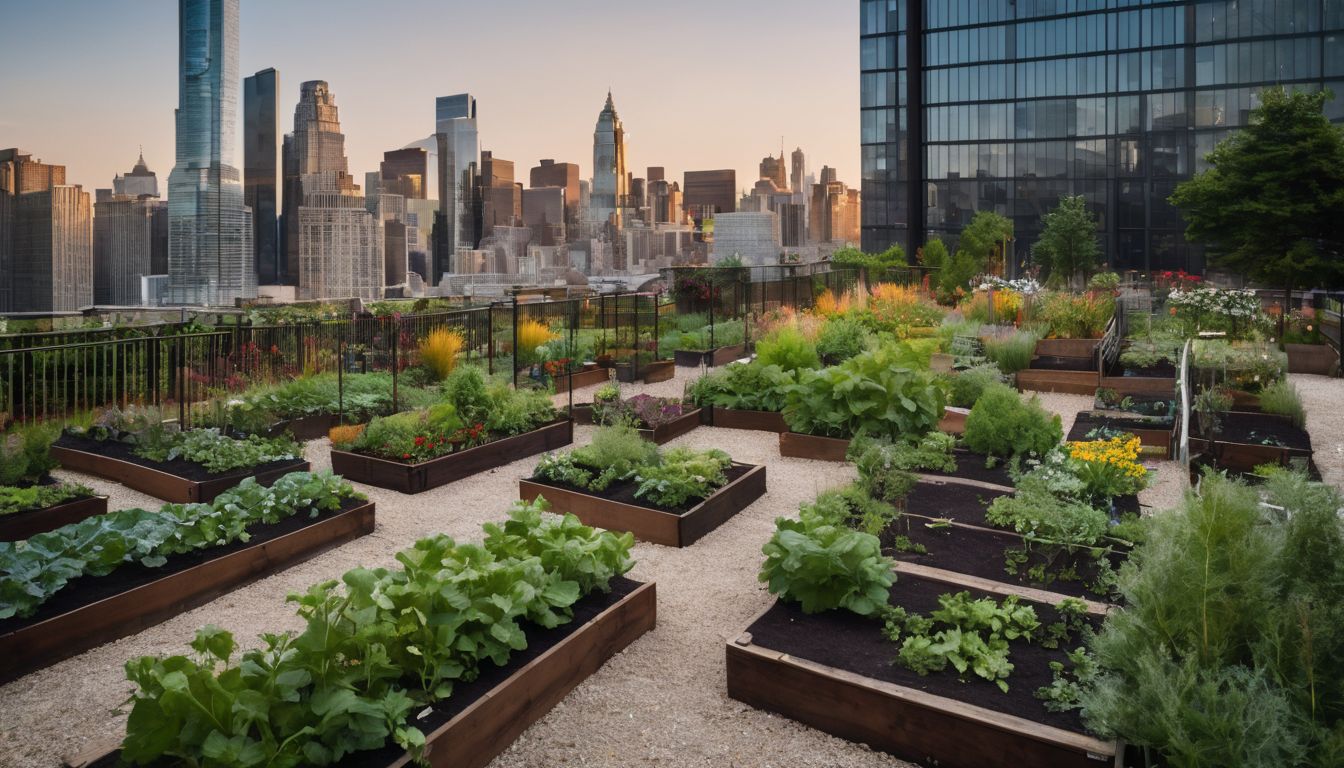Going to the farmers market is a fun and exciting way to shop for fresh and healthy foods. You get to personally talk to farmers, try a lot more varieties of fruits and vegetables than your typical grocery store carries, and more directly support the local economy. Plus, you lower your carbon footprint by eating locally and reducing your food miles! Unfortunately, not everyone has a farmers market near their home. Don’t just wait for one to arrive. Start your own farmers market!
BENEFITS FOR THE ENVIRONMENT: While most food travels around 1,500 miles from the farm to your plate, a farmers market is a great way to buy food directly from your local farmers.1 This means using fewer fossil fuels to send the food and fewer resources to preserve the food. Food at the farmers market isn’t just grown locally, but it’s a lot less likely to be processed or packaged, which minimizes even more equipment, travel, and materials.
BENEFITS FOR YOUR HEALTH: Farmers markets sell fresh fruits and vegetables, which are naturally wholesome and nutritious. In a grocery store, you might be more tempted to buy one of the standardized preserved, processed, or frozen foods. Instead, spend more time exploring the varieties of delicious organic and heirloom produce, which are all natural, chemical and preservative-free!
BENEFITS FOR YOUR COMMUNITY: Farmers markets support local farmers, helping to bring income and jobs to your community. These weekly events can also help make your community a destination for consumers rather than merely the starting point. Bringing people outside your community into it can also help support other businesses nearby, which benefit from the increase in foot traffic in front of their stores and restaurants.2
Cost: High
Starting a farmers market is just like starting your own business.3 You may need to spend tens of thousands of dollars in start-up costs and yearly expenses. Hopefully, in the end, you’ll recover all the money you invested.4
Time and effort: High
It will probably take over a year to get your farmers market up and running. That’s because it requires so much detailed research, drafting, and coordination.5
Steps to Start Your Own Farmer’s Market:
- Find a niche: Pick a place that you think would make a great location for a farmers market. Try to brainstorm many possibilities, since the place you first think of might not be available.
- Customer Demand: Even if you want a farmers market close to you, not everyone in your city might be as enthusiastic. Think about whether a farmers market fits for the demographic of the local community. Put ads in the newspaper asking for resident feedback on the idea of a farmers market. If you can, hold public meetings on the topic6 or submit the idea to the City Council7 to see what local residents think about a farmers market. Make sure you’re not competing with existing farmers markets or other produce vendors near you.8
- Neighbors and Local Retailers: Meet local retailers and neighboring houses around the area and ask them about any concerns they have about a farmers market. It’s always better to address any potential conflicts early on and to get as much local support as possible for your project.9
- Property: Once you find a good geographic area, narrow it down to some specific properties, like parking lots, public parks, town squares, or wide sidewalks.10 The closer the property is to a busy area in the city, the more likely it is that it can attract new customers. A farmers market should be easy to find, accessible, and big enough to fit at least 8 vendors. Look for overhangs, shade, or shelter to prevent weather from ruining the week’s market. Find places close to parking, public transportation, and restrooms so that customers can get to the location and stay for a while.11
- Contact experts and officials: The next step is to start making connections with people who know the process. Ideally, someone will be willing and able to provide guidance and advice on how to start your market.
- Managers of Farmer’s Markets: Managers of other farmers markets already have been in your shoes and have gone through the entire process themselves. Ask them about their experiences and what problems you should be looking out for. Ask them for any advice they might be able to give you. Check to see if your area has a farmers market association. If so, the organization might be able to handle all the permits and business structuring for you.12
- Chamber of Commerce: If you’re starting a for-profit farmers market, contact your local Chamber of Commerce. They can help you deal with the basic process of starting a small business. They may also tell you about any previous efforts to start a for-profit farmers market in the area, and about any problems that business encountered.13
- Permits: Contact your local Department of Health and the Department of Agriculture. Tell them your plan for the farmers market and ask them how you could get a permit in your area. In order to get a permit, you may have to change some elements of your plan in order to comply with local rules and regulations.14
- Legal Structure:
- Nonprofit or for-profit: Decide whether or not to make your farmers market a for-profit or non-profit operation. Keep in mind that for-profit operations have stricter management and tax rules and that any profit you might make on the whole thing would probably be pretty small.15
- Business Plan and Bylaws: Create a list of rules and bylaws that the vendors have to follow in order to have a farmers market function smoothly.16 How much of a hand will the farmers have in running the market? What kind of produce will be sold? Can vendors sell other growers’ products? Who will manage the market or resolve conflicts?17
- Get Farmers
- Create a Marketing Plan: You will have to pitch a business plan for your market in order to convince local farmers to sell in your market. Tell them when and where the farmers market will take place, and how you will be attracting customers to the farmers market.18 If possible, tell them about a unique selling point or marketing technique that your farmers market will use that puts it above the competition. They need to be convinced that participating in the farmers market will be a profitable investment.19
- Finding Farmers: Scout around nearby farmers markets. Many of the farmers will likely be looking for more business opportunities.20
- Applications: Once you’ve found some farmers, ask for them to fill out an application and then conduct interviews. Ask what produce they can bring to the market. To give customers more choice and variety, try not to overlap vendors as much as possible. Try to find knowledgeable, friendly, and consistent vendors that will keep customers returning every week. Make sure you know how much of which produce the vendor can sell at different times of the year, since the changing seasons can affect the variety of your produce.21
- Contracts: Hire an attorney to help you write a contract between you and the vendors. This can be used to set in stone the rules for vendors to follow. Will the vendor fee be based on size or location? What should be the basic stall size? What is the vendor responsible for?22
- Get Funding: If you’re lucky, you or you and a few of your friends are able to invest the money needed to start the project. However, unless you have tens of thousands of dollars to spend, you’re more likely to end up having to find supplemental sources of funding.
- Estimate Costs: To ask for financial assistance, you’ll need to know how much you need. List out all the expenses you expect to incur for the start-up of the market, and then ongoing expenses and projected revenue that will offset such expenses. If you hire a private market manager, expect to spend a large portion of your budget on his or her yearly salary. Decide what wage you would be willing to spend. Also remember to include marketing expenses, licensing, insurance, equipment, storage, and any supplies the market might need. It’s also common not to break even for the first few years.23
- Grants: Look around for any grants being offered that might be able to help fund new farmers markets. USDA Agricultural Marketing Service grants $10 million each year for farmers markets.24 Local governments, non-profits, and farmer co-ops may offer your market a grant if you can persuade them of how greatly your farmers market will help the local community and local farmers.25
- Fundraiser: If your farmers market is a non-profit, consider raising funds through local fundraising events or asking for donations.26 This can simultaneously act as a way to promote your farmers market.
- Loans: If your organization is for-profit, you can apply for small business loans. You can apply to commercial banks or federal agencies like the Small Business Administration.27
- Attract Customers: Now that you have everything ready, you need to let local residents know about the farmers market.
- Flyers and Brochures: The good thing about flyers and brochures is that you can just hand them out or post them in busy public spaces. On the brochure, let people know why this farmers market is better than their typical grocery store, like how it supports local and organic farming.
- Newsworthy Event: Have a big event or ask local politicians to come to the grand opening of the market. This might just attract the attention of the local newspaper or local news, which is free advertising!
- Newspaper Ads, Posters, and Coupons: Research has shown that repeat advertising is the most effective form of advertising. Buy a weekly ad in the newspaper or put up a banner in a public spot.28 If you buy a weekly ad in the paper for the next year, you can get a pretty low price per ad.29 Offer coupons and special promotions to attract new visitors.
- Have Fun: Although starting a farmers market is a lengthy and chaotic process, you’ll feel so proud walking through the farmers market that you put together yourself!




